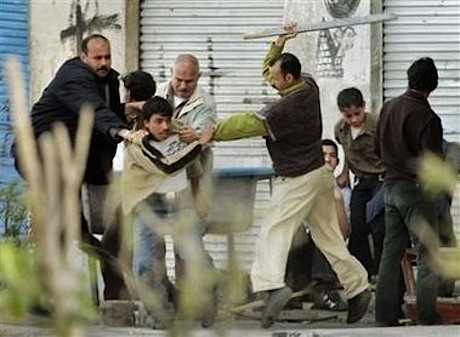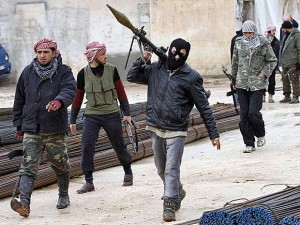http://conservativepapers.com/news/2011/12/03/muslim-refugees-yes-%E2%80%93-persecuted-christian-refugees-no/#.Ub4gcnlqq9t
Muslim Refugees, Yes – Persecuted Christian Refugees, No
Christians are in imminent danger across the world, and yet they are being refused refugee status, while Muslim refugee immigration goes on unimpeded.
U.S. policy regarding refugee resettlement would shock most Americans if they only knew. The United Nations picks who gets to come to the U.S. as a refugee. The mandate of the U.N. High Commissioner for Refugees (UNHCR) is to determine which of the world’s huddled masses comes to the U.S. as humanitarian refugees. And predictably, this U.N. body is favoring Muslims. Christians from Muslim lands are being refused refugee status.

This is occurring despite the fact that in their home countries, under the Shariah, Christians face persecution and many times certain death for their religious beliefs. At the same time, whole Muslim communities are entering the U.S. by the tens of thousands per month, despite the fact that in their home countries they face no religious persecution.
This is no accident. We know that the U.N. is driven largely by its largest bloc of countries, the Organization of Islamic Cooperation. The OIC is one of the largest intergovernmental organizations in the world. It is a religious and political organization with ties to the Muslim Brotherhood, an organization dedicated in its own words to “eliminating and destroying Western civilization from within.”
It is horrifying but true that Afghan Christians are being refused refugee status by the U.N. and many Western nations, including Great Britain. The U.N. claims that Afghan Christians do not meet the criteria for refugee status that is stipulated in Statute 6B of the UNHCR, which requires refugees to have “a well founded fear of persecution by reason of his race, religion, nationality or political opinion.”
I
s this why we expended incalcuable blood and treasure in Afghanistan? So that Christians would face persecution and slaughter? What was the objective? Shariah?
UNHCR trends for 2006 indicated that worldwide there were more than 32.9 million “persons of concern,” including around 11 million who were designated as “refugees.” Most of these came from Somalia, Darfur in the Sudan, Ethiopia, Iraq, Pakistan and Myanmar – all Muslim countries except Myanmar and Ethiopia (which has a huge Muslim population). That means that many refugees from these countries are non-Muslims seeking to escape religious persecution. But they are just the ones being denied.
The U.S. ranks third among the world’s nations in the number of refugees we host. Since 1976, millions of new citizens have entered the United States as legal humanitarian refugees, according to reports from the U.S. State Department. The large groups of Somalis that have recently come to the U.S. are certified as “humanitarian refugees” under our State Department rules. Whole Muslim communities are imported into the United States. When they get here, they are supported by social services provided by the Office of Refugee Resettlement of the U.S. Department of Health and Human Services. The cities that receive these huge numbers of refugees are.
Humanitarian refugees have literally won the proverbial lottery. Typically, they receive green cards as resident aliens within a year of arrival in the U.S. and are eligible to become full U.S. citizens within five years, unless they violate our immigration laws, commit a felony or are deported. In the process, they are provided with cash stipends and social services assistance from federal, state, NGOs and voluntary agency contractors.
But this lottery is not open to non-Muslim refugees. Back in October 2008, Muslim U.N. employees were “discouraging” applicationsfor resettlement from the desperate Christian Iraqis. The Christian Iraqi population has since been decimated: Over half of the pre-war Christian population of Iraq has now fled the country.
By buying into the argument that Islam is a religion of peace and ignoring the penalties for apostasy, we are sentencing thousands of Christians to martyrdom and forcing others to live in the shadows in dire poverty.
We need to demand that our government provide protection and asylum for Christian refugees and converts from Islam to Christianity who are threatened under Islam’s death penalty for apostates
.....................
by kalel Obama Plans to Resettle Syrian Refugees in California
By Paul Richter, Los Angeles Times
June 9, 2013, 6:26 p.m.
WASHINGTON — Two years into a civil war that shows no signs of ending, the Obama administration is considering resettling refugees who have fled Syria, part of an international effort that could bring thousands of Syrians to American cities and towns.
 A
resettlement plan under discussion in Washington and other capitals is
aimed at relieving pressure on Middle Eastern countries straining to
support 1.6 million refugees, as well as assisting hard-hit Syrian
families.
A
resettlement plan under discussion in Washington and other capitals is
aimed at relieving pressure on Middle Eastern countries straining to
support 1.6 million refugees, as well as assisting hard-hit Syrian
families.The State Department is “ready to consider the idea,” an official from the department said, if the administration receives a formal request from the United Nations Office of the High Commissioner for Refugees, which is the usual procedure.
The United States usually accepts about half the refugees that the U.N. agency proposes for resettlement. California has historically taken the largest share, but Illinois, Florida, Pennsylvania, Maryland and Virginia are also popular destinations.
U.N. refugee officials, diplomats and nongovernmental relief groups plan to discuss possible resettlement schemes at a high-level meeting this week in Geneva. Germany already has committed to taking 5,000 people.
“It was probably inevitable that in this crisis, with these overwhelming numbers, governments would start moving in this direction,” said Lavinia Limon, chief executive officer of the U.S. Committee for Refugees and Immigrants, a Virginia-based advocacy and service group. “But there will be resistance.”
The Obama administration supports rebels trying to oust Syrian President Bashar Assad, but is wary of deeper involvement in Syria.
The issue is politically sensitive on several levels.
Congress strongly resisted accepting Iraqi refugees, including interpreters who had worked with U.S. forces, after the 2003 U.S.-led invasion. Most lawmakers share White House caution about getting more engaged in Syria and may have little appetite for a major influx.
But Susan Rice, President Obama’s new national security advisor, and Samantha Power, Obama’s nominee for U.S. ambassador to the U.N., both have been strong advocates for refugees. They may make the White House more receptive to at least a partial opening.
Homeland security officials require careful vetting of refugees, with multiple interviews and background checks before they are allowed to enter the country. Under normal circumstances, the screening process can take a year or longer.
U.S. officials are likely to be extra careful with Syrian refugees. As Islamic militants take a more prominent role in the rebel forces, officials worry about fighters with Al Qaeda ties trying to enter the country. Two resettled Iraqis were convicted of trying to send arms to Al Qaeda from their home in Bowling Green, Ky.
The refugee dilemma is more acute for countries that lie on Syria’s borders.
Jordan, Turkey and Lebanon, which have absorbed the bulk of the refugees, worry that a resettlement plan could actually widen the flood if Syrians see a chance for a better life in North America, Europe or Australia.
Jordan and Lebanon each have taken in about 500,000 refugees and Turkey has more than 375,000, according to the U.N. refugee agency. It predicts that the total number of refugees will double to 3.2 million by the end of the year.
Turkey already has demanded that the West take some its refugees, even proposing an airlift to fly them abroad. Prime Minister Recep Tayyip Erdogan, who has faced angry protests against his government for giving refuge to so many Syrians, declared last month, “We are the first victims of the Syrian situation.”
Some Middle Eastern officials worry they may get stuck housing and feeding refugees for months or years while the West does the vetting, leading to an even longer logjam and more domestic political turmoil.
“Their view is that unless this involves big numbers, it’s not worth doing,” said a European official, who declined to be identified because of the sensitivity of the subject. “You need to be talking about tens of thousands of people.”
Western officials try to discourage poor foreigners who are seeking a more comfortable life or business opportunities in the West. They say resettlement is only for those who can’t go home, and seek to dispel notions that an easy life awaits.
According to a State Department publication aimed at refugees, “Cars are not provided…. Most Americans value self-reliance and hard work. They expect newcomers to find jobs as soon as possible and to take care of themselves and their families.”
Another sensitive issue is who qualifies for resettlement. Western countries often prefer intact, well-educated families with familiar religious backgrounds.
But experts say 80% of the Syrian refugees are women and children, many with war-related injuries or psychological problems that could hamper finding work or going to school.
Kirk Johnson, founder of the List Project, which has pushed for Iraqi resettlement, said it may be difficult to sell Syrian resettlement to Congress. He said it would require an advocacy effort and sympathetic lawmakers, “and I don’t seen either of those necessary ingredients.”
Yet most refugee advocates predict that Americans will ultimately help the Syrians.
“Americans have a long tradition of welcoming refugees,” said Daryl Grisgraber, a Washington-based Middle East specialist at Refugees International, which provides advocacy and services for refugees. “They’ll respond here, too.”
paul.richter@latimes.com
Copyright © 2013, Los Angeles Times
No comments:
Post a Comment